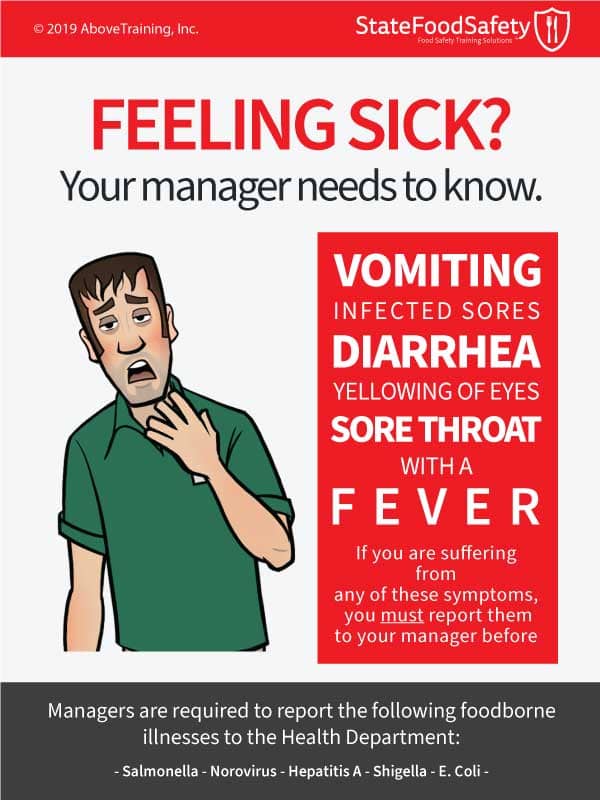 Nobody wants to find out that their food has been handled by someone sick with vomiting or diarrhea. The thought of eating food prepared or served by an ill food employee is more than unappetizing—it’s frightening. Unfortunately, reports show that 12% of food workers admit to having worked when they were sick. Perhaps you aren’t sure when to tell your manager that you are too sick to come in. Let’s take a look at some things that should help you identify what your manager needs to know concerning your illness.
Nobody wants to find out that their food has been handled by someone sick with vomiting or diarrhea. The thought of eating food prepared or served by an ill food employee is more than unappetizing—it’s frightening. Unfortunately, reports show that 12% of food workers admit to having worked when they were sick. Perhaps you aren’t sure when to tell your manager that you are too sick to come in. Let’s take a look at some things that should help you identify what your manager needs to know concerning your illness.
When should a food worker call in sick?
If you’re not sure when to notify your manager of your sickness versus “tough it out” and go to work, here is your answer. The FDA Food Code lists the following as symptoms that must be reported by food handlers to their managers: vomiting, infected sores, diarrhea, yellowing of the skin or eyes, or a sore throat accompanied by a fever. It is possible that you have a longer list of reasons to work than to call in sick. You may feel that you are being a responsible worker by keeping the truth from your manager. According to research, the number one reason that food employees work while sick is to help with the large workload of the restaurant. However, these are the facts—every year nearly 48 million people in the United States get sick, 128,000 are hospitalized, and 3,000 die of foodborne diseases. If you are sick or recovering from any of the symptoms above, you should stay home to avoid spreading a foodborne illness.
The Big 5 foodborne illnesses
In addition to reporting symptoms, you must notify your manager if you have been diagnosed with one of the “Big 5” infections. The “Big 5” are five of the most common pathogens that are easily transmitted through food and cause severe foodborne illness. These five pathogens are: Shigella, E. Coli, Salmonella, Hepatitis A, and Norovirus. If you are aware that you have been exposed to one of the “Big 5,” even if you do not suspect yourself of being ill, it is best to let your manager know. As the old saying goes, it is better to be safe than sorry. You won’t be doing anyone a favor by passing along a foodborne illness.
Food safety managers
The food safety principles taught in this article are captured in our Feeling Sick? Poster. Print the poster and use it to review this critical message with your staff. Let them know how important it is to protect customers from foodborne illness carried by sick food handlers. Hang the poster in areas of your work establishment where employees will see it, like the break room or next to a handwashing sink. Encourage food employees to acknowledge their illnesses and reassure them that there will be no pressures to work while ill. Remind employees that you are depending on them to take responsibility to report their symptoms. It is imperative for food employees not to go to work when they are sick.
So . . . feeling sick? You know what you need to do. If you can’t remember the symptoms to report to your manager, consult the poster. It can be difficult to miss work, but please remember that foodborne diseases kill thousands of Americans each year. You are responsible for the safety of those you serve.
To learn more food handler safe practices, check out our Food Handler Training!
Share our poster with others!
- Download and print: Click on a size below to download and print out the poster.
- Share the link: Share https://www.statefoodsafety.com/Resources/Posters/feeling-sick on your website or social media.
- Embed the poster on your site by copying this code: <a href=”https://www.statefoodsafety.com/Resources/Posters/feeling-sick”><img src=”https://cdn.statefoodsafety.com/blog/2016/03/Feeling-Sick-Poster-2019-compressor.jpg” width=”100%” border=”0″ /></a>
— Ariel Jensen
Editor’s note: This post was originally published in March 2016 and has been updated for freshness, accuracy, and comprehensiveness.



